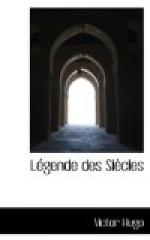[Footnote 4: With this picture in verse of the fight between the castle and the storm should be compared the prose picture of the fight between the fire and the water in Le Rhin (Lettre xix).]
Hugo loves especially to endow with life objects that suggest a struggle. It is the wrecked and broken ship of Pleine Mer rather than the triumphant vessel of Plein Ciel that is animate.
Ce Titan se rua, joyeux, dans la
tempete;
* * * * *
Quand il marchait, fumant, grondant, couvert de
toile,
Il jetait un tel rale a l’air epouvante
Que toute l’eau tremblait.
* * * * *
Et pour l’ame il avait dans sa cale un enfer.
Allied with this habit of vivifying the inanimate is the more subtle artifice of transfiguring or magnifying concrete objects, so that they become symbolic without ceasing to be real. This blending of the actual and the figurative is seen in the description of the King and Emperor in Eviradnus:
Leurs deux figures sont lugubrement grandies Par de rouges reflets de sacs et d’incendies. * * * * * Leurs ongles monstrueux, crispes sur des rapines, Egratignent le pale et triste continent.
In La Confiance du Marquis Fabrice the reality of the wine and the suggestion of the blood are very artfully mingled
Quelque chose de rouge entre les dalles
fume,
Mais, si tiede que soit cette douteuse
ecume,
Assez de barils sont eventres et creves
Pour que ce soit du vin qui court les
paves.
Another remarkable feature of Hugo’s literary art is the feeling for light and shade which it displays. He likes to wrap his poems in a physical atmosphere of brightness or gloom, corresponding to the sentiment which pervades them. How, for instance, in Les Orientales, that exquisite little gem, Sarah la Baigneuse, flashes and sparkles with light! How striking in La Fin de Satan is the contrast between the murky atmosphere in which the maker of crosses works and the bright sunshine in which Christ’s triumphant entry into Jerusalem is bathed! With what consummate art the darkness of the Crucifixion is made to accentuate the horror of the event!
L’ombre immense avait l’air
d’une accusation;
Le monde etait couvert d’une nuit
infamante;
C’etait l’accablement plus
noir que la tourmente,
La morne extinction de l’haleine
et du bruit.
Contrast the radiance of the dawn in which the Satyr, the emblem of strong and joyous Nature, is first seen:




